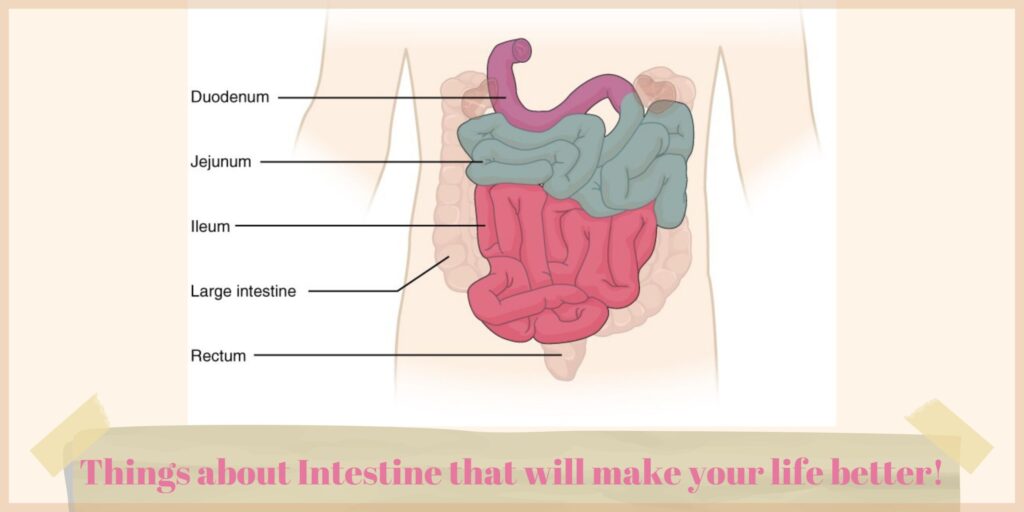Functions of the intestine
The functions of the intestine, its various varieties, and how to keep your intestine intact are discussed in this post. The intestine, commonly known as the bowel or bowels, is a muscular tube that runs from the bottom point of the stomach to the anus, the lower orifice of the digestive system. The intestine is split into different segments termed the small intestine, and the large intestine is where food and digestive products move through. The small intestine is curled within the lower abdominal cavity below the stomach, while the large intestine encircles it, outlining the abdominal cavity’s edges. The small intestine resembles a lengthy, pink or red tube with several folds that measure around the size of your pointer finger. It is the width, not the length, that distinguishes it as “smaller” than the big intestine. The small intestine is lined by numerous layers of tissues and muscles, each containing nerves, blood arteries, immune cells, and lymphatic glands. The large intestine resembles a semi-flat, segmented conduit that lies freely about the abdominal cavity’s walls, with a seam running vertically down the centre, bulging the sections along both sides.
Small Intestine
The small intestine is a portion of the digestive system, and it is a part of the gastrointestinal GI tract, which is a long road through that food travels through the body. After leaving your stomach, food passes through the small intestine, also known as the small bowel. The small bowel joins the large bowel, commonly known as the colon or large intestine. The intestines are in charge of breaking down food, assimilating nutrients, and solidifying waste. The small intestine is the most extended section of the GI tract and is where the majority of your digestion occurs. The functions of the intestine involve digesting food and creating numerous chemicals that transmit messages to other regions of the body. The small intestine is where the majority of the lengthy digestive operation actually occurs. It includes breaking down meals in an organised manner, absorbing nutrients, extracting water, and transporting food along the gastrointestinal tract, among other tasks that can take up to five hours. Researchers discovered that vitamin C could assist the intestinal barrier function, which helps the body ingest nutrients and protects you from contaminants.
Large Intestine
The colon, rectum, and anus are all part of the large intestine, one continuous tube extending from the small intestine as food draws nearer the finish of its trip via the digestive tract. When you poop, the big intestine converts food waste into faeces and excretes it from the body. Combating pathogens and controlling the body’s water balance is one of the functions of the intestine. The large intestine is the final segment of your gastrointestinal (GI) tract, a lengthy, tube-like channel via which food passes along the digestive system. It connects the small intestine to the anal canal, where food waste is disposed of, and food waste is produced into excrement, stored, and eventually expelled in the large intestine, also known as the large bowel. The colon, rectum, and anus are all part of it, and the term “colon” is sometimes used to refer to the entire large intestine. The digestion technique has liquified the food, and the majority of the nutrients have been assimilated when it reaches the large intestine from the small intestine. The colon’s task is to dehydrate and shape the remaining food into faeces, and it accomplishes this by gently collecting water and electrolytes as the waste is moved along by its muscle system. In the meantime, the chemical component of digestion is completed by bacteria in your colon eating up the waste and breaking it down even further.
Tips for Healthy Intestine
The following general health recommendations will assist you in maintaining a healthy digestive system: Eat extra fibre, which helps clean away residue in your colon and produces muscle contractions that transport food through it, and the ideal method to get it is by eating vegetables. Consume healthier fats: saturated fats, like those present in red meat, have been linked to an increased risk of colon cancer. Healthy fats, such as Omega-3 fatty acids found in oily fish, on the other hand, promote the growth of beneficial bacteria in the intestines. Drink extra water since the functions of the intestine require a lot of water for detoxification, lubricating, and absorption of nutrients, and many of us don’t get sufficient of it. You’re undoubtedly aware that smoke and alcohol raise stomach acid, which corrodes the protecting coating. Eat less sugar and sweets, as too much sugar or artificial sweeteners can lead to gut dysbiosis or microbial imbalances in the intestines.



